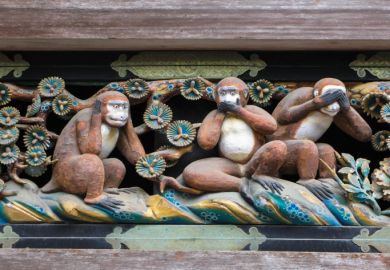Is there any unifying principle or activity at work within a modern university? Try finding the professor of biotechnology who is spending the week patenting gene applications, or look for the professor of management who is out doing consultancy work for a global company, perhaps only the professor of medieval history may still be working late interpreting manuscripts. What is left to bring them all together into any form of uncontested unity?
Ronald Barnett's book hammers home repeatedly the message that the university has dissolved irreversibly: "As an institution with rules of its own that governed what it is to know, the university is no more." Moreover, there is no unifying sense as to what counts as legitimate inquiry, the gaps between the ever-multiplying forms of knowledge accentuating as time passes. "Supercomplexity" is the shorthand term used by Barnett for the state of affairs in which we find ourselves: one of uncertainty, unpredictability, challengeability and contestability. The academic domination of knowledge production has been severely dented - more probably challenged altogether.
The late Bill Readings in his 1996 book The University in Ruins notes three "ideas" that animate the modern university: the Kantian concept of reason, the Humboldtian idea of culture and the current techno-bureaucratic notion of excellence. The problem with the third is that it has no content - it is this that gives Barnett the starting point for his essay, which characterises the scene of modern knowledge as one of supercomplexity.
We live in a world open to infinite interpretation, and it is this phenomenon that students must be prepared for as it is the present context of all research and knowledge. Supercomplexity means that we confront a surfeit of data of which the academic is both consumer and provider. It is impossible to keep abreast of any field, but we are condemned to do so in the absence of any tools of self-understanding.
There are cognitive as well as operational challenges in an environment increasingly subjected to managerial disciplines and expectations of performance. Academics, somewhat like doctors, now face a clientele possessing competitive claims based upon the assertion of rights in the face of instructors and mentors. The internet is the "sharpest symbol" of the boundarilessness in which the modern university finds itself. There is a multiplication of frames of understanding and of self-identity, and from this arises the supercomplexity through which Barnett's book is set to guide us.
This book's great contribution, despite its needless opacity and repetitions, lies in its success in bottling and labelling the widely felt forms of unease that bedevil modern university life. The university is no longer "its own end". It has been thoroughly boxed in by the state with intrusive evaluative procedures. The new disciplines of a procrustean managerialism have curtailed the freedoms that were once among the defining characteristics of academic life. The arrival of a market has reduced the autonomy that was once deemed to be its essence, and in a pursuit of "kudos", exacerbated by research assessment exercises, textual production is favoured irrespective of whether there is an audience for the product. In a production-dominated knowledge economy, academic texts are increasingly reduced to the status of data. Being more managed, academics are now more subject to external and internal scrutiny. Teaching has become commodified and subject to constant evaluation, and what was once a private and interpersonal activity has become public.
And as Jean-Francois Lyotard pointed out, the new performativity is consistent with the changing knowledge practices of the university. For knowledge has turned into knowledges: as the old grand narratives of academic knowledge creation fall away, each form of knowledge is left to fend for itself, to fight its own way in the world. Commonalty of language, tradition or ideology recede as our criteria of truth alter in order to accommodate the many new canons of performativity. The frames of knowledge prevalent in the academy are no longer judged by their power to describe the world but through their use value - performativity has become the strident new ideology.
Barnett has also a great deal to say about the emerging forms of knowledge that are subject to this new public discipline. Knowledge is in transition from the contemplative to praxis, and so research funding becomes available in accordance with the likely practical yield (in patent-registration, in technology transfer) from each site of epistemological interest. Business studies, nursing studies, transport, education, tourism, biotechnology, computer science - we are all familiar with the new instrumentalist subjects, but the same criteria of usefulness are also invading the contemplative fields. "Performativity creeps in surreptitiously and nestles in the frameworks of understanding inhabited by academics." Take, as perhaps a supreme example, the growing inter-dependence and mutual stimulation of semiotics and advertising.
A university living in the realm of supercomplexity is one in incessant turmoil, one in which all the basic assumptions of one's self-identity as researcher, scholar and teacher are kept perpetually in the air. But this, if properly understood and applied, is where the university can work its way into a kind of rebirth. "A new kind of university is possible which disavows its predecessor." Among the new multiplying forms of knowledge are those of communicative understanding, practical wisdom, action learning, critical self-knowledge, all of which suggest new roles within supercomplexity, and in particular that of making supercomplexity itself multiply further. The postmodern university acts with increasing influence in the world, without necessarily existing anywhere in particular, for it may consist of all the knowledge networks into which its staff is linked. So the university may no longer be a site of knowledge as such, but rather a site of knowledge possibilities.
But in the new supercomplex university much survives, including many of the self-pretensions of the Enlightenment university, which the new institution needs to live up to. Performativity has not absolutely replaced the Enlightenment heritage, and in clinging to what remains of inherited values, modern universities should become much more vibrant places, though living in constant turmoil amid radical uncertainty. Barnett says at one point that "supercomplexity calls for continual pandemonium". Although an academic's assumptions as to his own identity as teacher, researcher and scholar are kept in the air, the university's responsibilities remain pedagogic, civic and epistemic - that is, the inherited processes remain intact as they become sites for the continual production of revolutionary ideas.
In constructing an ethos for the late-modern university, we have to accept matters as they are. We must acknowledge that we face multiple uncertainties and that nothing has any solid basis to it. We have to relinquish all the comforting self-identities for academics, such as "neutral umpire", "excellence", "the self-critical academic community", for none of them works any longer. Postmodernism means that the epistemological slate is being scraped clean, while, in performativity, a new unifying narrative is emerging, but one that strikes at the core of the western university as the site of disinterested reason. All our new knowledges are predisposed towards changing the world, towards a constant ushering in of new worlds.
A strange aspect of this book is the sudden gush of optimism that Barnett gives himself as he looks at the future of the "ruined institution" he is analysing. Under conditions of supercomplexity, higher education is obliged to produce a dislocation among its students but also to enable them to live effectively through it. But a genuine higher education is indeed possible, one that calls for the highest order of self-reflexiveness, one that understands that at best, only a precarious stability is attainable. In this higher education, there can be no grand narratives of truth, justice, economic competitiveness, virtue, community, only the acceptance that there is no security to be had. Barnett says that what is on offer, for the first time, is the realisation of a fully educated human being.
Anthony Smith is president of Magdalen College, University of Oxford.
Realizing the University in an Age of Supercomplexity
Author - Ronald Barnett
ISBN - 0 335 20249 7 and 20248 9
Publisher - Open University Press
Price - £60.00 and £19.99
Pages - 200
Register to continue
Why register?
- Registration is free and only takes a moment
- Once registered, you can read 3 articles a month
- Sign up for our newsletter
Subscribe
Or subscribe for unlimited access to:
- Unlimited access to news, views, insights & reviews
- Digital editions
- Digital access to THE’s university and college rankings analysis
Already registered or a current subscriber? Login



